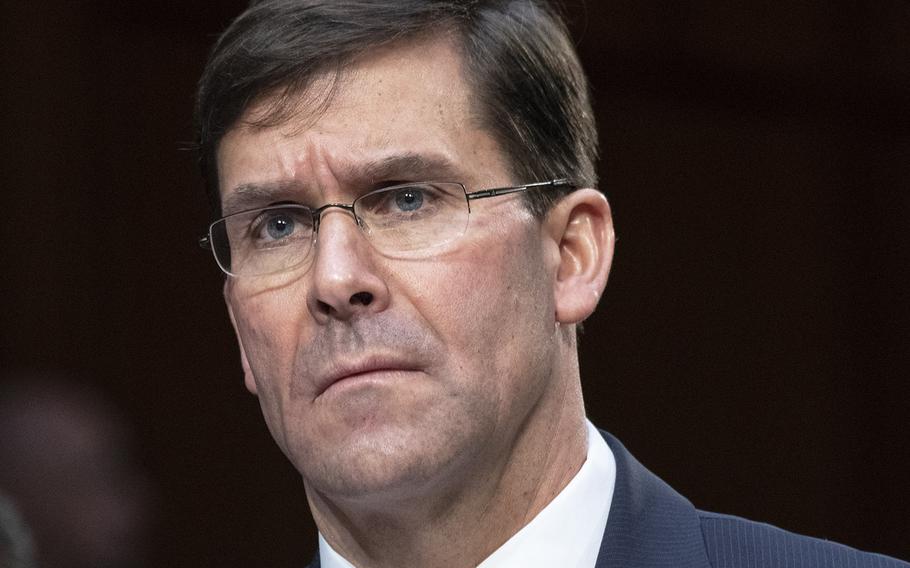
Defense Secretary Mark Esper, seen here in a March, 2019 photo, says the United States has made "no decision" about withdrawing troops from Iraq. (Stars and Stripes)
WASHINGTON – The Pentagon’s top civilian and general said Monday that the U.S. military had no plans to leave Iraq, disavowing an American general’s draft letter mistakenly made public that appeared to indicate an imminent troop withdrawal.
“There has been no decision made to leave Iraq. Period,” Defense Secretary Mark Esper said Monday at the Pentagon. Troops in the country will be repositioned in some cases, he said, to take a more defensive posture as the United States prepares for potential Iranian retaliation after the strike last week that killed Maj. Gen. Qassem Soleimani.
The letter from Marine Brig. Gen. William Seely, the chief of the coalition’s Iraq task force, was “an honest mistake,” said Army Gen. Mark Milley, chairman of the Joint Chiefs of Staff.
The letter circulated on Twitter on Monday afternoon and prompted news reports that the United States would leave Iraq. Several unnamed defense officials confirmed the authenticity of the letter, however Milley said it was a draft that should not have been provided to the Iraqis. A defense official, who spoke on condition of anonymity, fingered the Iraqis for the letter’s leak.
“It’s a draft,” Milley said. “It’s unsigned. People are trying to do the right thing in a highly dynamic situation, and it should not have been sent.”
The errant letter came shortly after Iraqi lawmakers voted to approve a nonbinding resolution calling for the government to begin the process of expelling the U.S.-led coalition from the country in response to the killing of Soleimani, head of the elite Quds Force, alongside Abu Mahdi Al-Muhandis, the Iraqi leader of Kataeb Hezbollah, a Shiite militia aligned with the Iraqi security forces.
That killing, in a U.S. drone strike, drew threats of retaliation from Iran and calls for American troops to be expelled from the country for violating Iraq’s sovereignty.
Also on Monday, Iraqi Prime Minister Adel Abdul-Mahdi met with U.S. Ambassador Matthew Tueller, stressing the need for “joint action” to begin the withdrawal and saying that Iraq was making every effort to prevent the situation from sliding into “open war,” his office said in a statement posted to Twitter.
But Esper was adamant that American troops would remain in Iraq to fight the remnants of ISIS, which retains an underground presence in the country. The United States has paused its counter-ISIS mission, including training Iraqi forces, as it bolsters security in case of Iranian attacks.
“We are committed to the de-ISIS mission in Iraq alongside our allies and partners,” Esper said, indicating he expected that mission to continue in the future.
For now, the United States is moving troops within Iraq, including moving in additional forces from Kuwait, Milley said. The Pentagon last week announced plans to deploy thousands of troops – including a brigade of the Army’s 82nd Airborne, Army Rangers and Marines – into the Middle East amid the heightened tensions with Iran.
The draft letter highlighted U.S. appreciation of Iraq’s sovereignty and expressed hope it would continue to work together as partners.
"In deference to the sovereignty of the Republic of Iraq, and as requested by the Iraqi Parliament and the Prime Minister, [the anti-ISIS coalition] will be repositioning forces over the course of the coming days and weeks to prepare for onward movement," Seely’s letter read.
Milley characterized it as imprecise.
“It’s poorly worded,” Milley said. “It implies withdraw, but that is not what is happening.”
Milley and Esper on Monday also defended President Donald Trump’s decision to kill Soleimani, saying his death likely delayed or impacted imminent attacks on American forces through the Middle East.
The senior Pentagon leaders declined to describe the nature of those attacks or offer evidence they were imminent, saying providing such details could reveal classified sources and methods for intelligence gathering.
They were scheduled to brief lawmakers on that Iran intelligence on Wednesday.
“Very few people saw that intelligence,” Milley said. “I will stand by the intelligence I saw – it was compelling, it was imminent, and it was very, very clear in scale and scope. He was planning, coordinating and synchronizing significant combat operations against U.S. military forces in the region, and it was imminent.”
Stars and Stripes reporter Chad Garland contributed to this report.
dickstein.corey@stripes.com Twitter: @CDicskteinDC